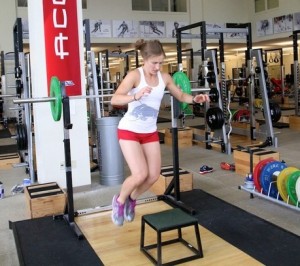 Unless you’re planning to just cruise groomers all day, you may find that your skiing consists mostly of high output bursts punctuated with short rest intervals. To this end, interval training of any kind may have greater crossover benefits than straight strength or endurance sessions. Treadmill sprints, spinning classes, and jump rope work are some good options.
Unless you’re planning to just cruise groomers all day, you may find that your skiing consists mostly of high output bursts punctuated with short rest intervals. To this end, interval training of any kind may have greater crossover benefits than straight strength or endurance sessions. Treadmill sprints, spinning classes, and jump rope work are some good options.
Along these same lines, any weight training should now involve some low weight / high rep sets. When you’re doing those squats, fifty reps with 80lb simulates that bump run much better than ten reps with 200lb. To further simulate skiing motions, use a wider stance (treating both legs as the outside turn leg) and do not allow your knees to lock out at the top affording a brief rest.
Focus on including explosive movements into your routine. Box jump variations (lateral or “Poor Man’s Skiers Edge”) are great ways to accomplish this. True “plyometric” jumps where you jump down off the box, land, and immediately rebound into an upward jump may have the strongest benefits for skiing.
This is non-intuitive, but the next time you are skiing hard such as aggressive GS turns, notice how much time you actually spend statically in the crouched position. As lactic acid builds, the thighs begin to burn and as you lose muscle power you naturally begin to straighten up. So while explosive training is good, static or “isometric” training is equally important. Target the quads by briefly holding the bottom position of a squat on each rep or do isometric wall squats by placing your back against a wall and lower yourself until your thighs are parallel to the floor and your shins are parallel to the wall. Your knees should be bent at 90 degrees. Hold the position for 10-30 seconds and repeat.
Finally, if you have that traditional lifting routine you can’t give up, just spice it up. Between each set do 50 jump ropes instead of resting. You should have over a 1000 by the end of a good workout!
CLICK HERE to see a scientifically thought out approach to a skier specific workout
When it comes to cardio, running is certainly one of the most popular forms of training. While a long leisurely run is therapeutic, it may not help you as much for skiing as some interval sprints. For a great treadmill regimen, set the ramp angle at 1%, set the speed at a fast run (I like about 9 mph / 6.5 min. mile). Run for 35 sec, then jump off onto the sides for a 25 sec rest. Repeat this for 15 minutes. Try it, and then tweak any of the parameters to what works best for you.













